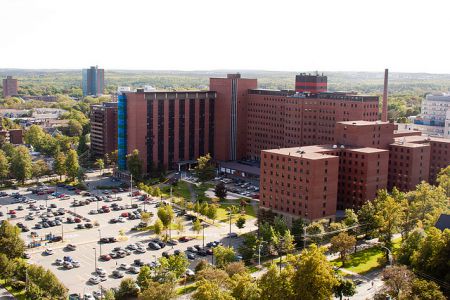KJIPUKTUK (HALIFAX) – An 84-year old woman who suffers from dementia and a variety of other serious ailments will be discharged from the Victoria General (VG) later this week.
But her daughter Bernadette Boyd is adamant that sending her mother home is unsafe, even with the six hours of home care per day the Nova Scotia Health Authority wants to provide.
“She is not capable of being in her own home unless they send her home with a nurse 24 hours a day,” Boyd tells the Halifax Media Co-op. Apart from dementia, Boyd's mother also suffers from congestive heart failure, chronic obstructive pulmonary disease, an aneurysm in her stomach, and hernia in her bowel.
Boyd believes that the Nova Scotia Health Authority is sending her mother home to relieve pressures on the ancient hospital. The facility recently experienced extensive flooding caused by a burst pipe.
“Since she has been in the VG transitional care, we hadn't heard anything about her being moved out until the flood, and now they have to get rid of all these patients,” Boyd asserts.
Based on their assessment the hospital decided that with six hours of home care Boyd's mother can safely return to her home in Herring Cove.
Boyd believes that assessment was seriously flawed. For one thing, a family member should have been present during the assessment, Boyd says. “Our mother has dementia, and although she may answer questions one minute, she may have no recollection of it the next minute.”
Boyd would like to see her in mother placed in a long-term care facility. Until proper care becomes available she should stay in a hospital like the Dartmouth General or the Halifax Infirmary, she says.
Boyd's mother is far from the only one waiting for a spot in a long-term care facility. In early May there was a waiting list of about 2,100 Nova Scotians, all waiting for a long-term care bed. The average wait is nine months.
Add an aging hospital infrastructure to the mix, and Nova Scotia is sitting on a ticking time bomb. After the flooding Health Minister Leo Glavine told the CBC that pipes at the VG are corroded and that there is nothing to prevent another flood if another connection point were to snap.
Boyd is not impressed.
“There have been problems with the VG building for years, and they are lucky that just one pipe broke,” says Boyd. “I find it alarming that they even have critically ill people at the VG hospital.”
“I don't want to push my problems off on government, but the government created the problem because there aren't enough facilities.”
Boyd has contacted the Health Authority and minister Glavine but hasn't heard back yet.
The Halifax Media Co-op has asked that both the Nova Scotia Health Authority and the Department of Health and Wellness comment on the situation. We will update the story once we receive these responses.
Updated: In an email from Nova Scotia Health Authority spokesperson Everton McLean quotes Karen Mumford, Senior Director, QEII Health Sciences Centre, as saying that no patients from the community transition unit were sent home because of the flood.
“A person can only be discharged from this unit by a physician, if and when the physician has determined the patient is medically able to be discharged. No one is discharged before he or she is ready from their physician’s perspective,” the email states.
The issue raised by Bernadette Boyd about her family not being present during the assessment interview is not addressed in the email.
Follow Robert Devet on Twitter @DevetRobert



